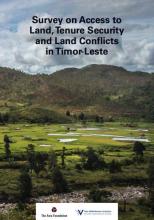Land Library
Welcome to the Land Portal Library. Explore our vast collection of open-access resources (over 74,000) including reports, journal articles, research papers, peer-reviewed publications, legal documents, videos and much more.
/ library resources
Showing items 1 through 9 of 56.Contains framework for analysing the gender impacts of foreign investment in agriculture; gender analysis of the certification criteria of voluntary sustainability standards and responsible investment frameworks; do voluntary sustainability standards improve gender equality?; lessons for responsi
Contributes to the research gap on host country governance dynamics by synthesizing results and lessons from 38 case studies conducted in Ethiopia, Ghana, Nigeria, and Zambia.
Training volunteers to help their communities defend their land rights has proved an effective approach for promoting land justice in Tanzania.
Seeks to answer the question, where collective tenure arrangements are either being formalized or supported for the sake of securing the community’s rights to land, what steps are required to strengthen women’s land rights in the process?
A toolkit of 26 items designed for people designing or improving community-based paralegal programmes. It draws lessons from both grassroots experience and research. Includes
Continued stability and future development in Timor-Leste are dependent on establishing the necessary legal and administrative mechanisms for providing access to land, land tenure security, as well as preventing and addressing land-related conflict.
This study aimed to pilot an innovative land survey to provide quantitative data regarding landrelated issues in Timor-Leste, in order to support the Timorese government and parliament in developing evidence-based land policies and legislation, as well as more informed advocacy of civil society.
A case study of the situation in Lamu, Isiolo and Siaya Counties by the Land Development and Governance Institute (LDGI).
A discussion paper attempting to take stock of what works and does not work in interventions seeking to promote and enhance women’s land rights. Looks at both individual and community land tenure, rural and urban land, arable and forest land.


